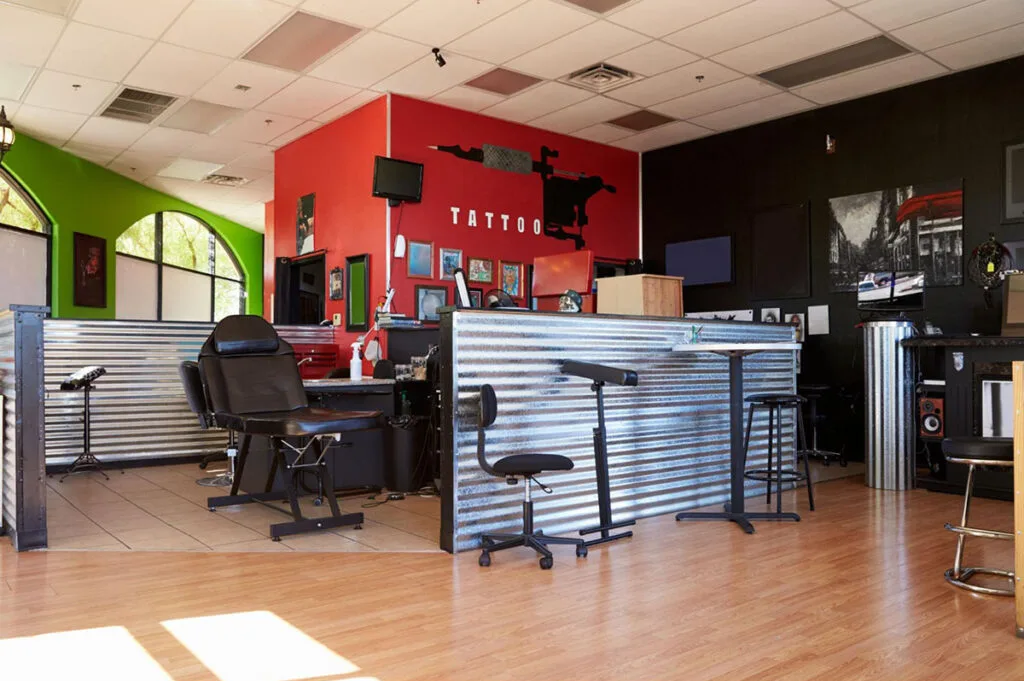Opening a tattoo shop: 10 steps to launch your business
Once a sign of rebellion, tattoos are now part of the mainstream. Three in 10 Americans have at least one tattoo—including 40% of people under 35—and the numbers are increasing every year. Plus, the average American doesn’t stop at one: People with tattoos get an average of four in their lifetime.
If you’re thinking of opening a tattoo shop, now is the perfect time to enter the industry and help create the permanent body art millions are seeking. Follow these important steps to bring your business idea to life.

1. Choose your business name
Your brand name can give you a competitive advantage in your local market. Strong business names clue shoppers in on what you do and what makes your brand experience different.
First, identify your approach to the art form and business. Do you specialize in any kinds of tattoos, such as fine line or minimalist designs? Will you offer other services, such as piercings? If so, you can include these elements in your name. For example, a shop that specializes in delicate, fine-lined artwork could be named “The Razor’s Edge.”
Start brainstorming business names in a written list. Then, make sure your top choice is legally available using your state government’s name search tool—like the Florida Division of Corporations’ fictitious name search—and the U.S. Patent and Trademark Office’s database before proceeding. If your top choice is taken, go down the list until you find one that’s available.
2. Select your business structure
Your business structure affects how your tattoo shop is taxed, what annual paperwork you file, and your level of personal liability when your business owes cash to lenders (or is sued). There are different legal structures you can choose from—including Limited Liability Companies (LLCs), S corporations, and C corporations—and there’s no right or wrong answer:
- LLCs
- S corporations
- C corporations
However, it’s generally not recommended to operate a tattoo shop as a sole proprietorship or partnership. Though these business entities can be easier to launch since there’s no required paperwork or costs in most states, they leave you with more personal liability in an industry that has its own inherent risks. Since your team is regularly working with clients using needles and permanent ink, there’s always potential for injury, blood-borne illnesses due to poor sanitation, and other issues with unhappy clients. If your business is sued or defaults on a loan, your personal assets could be at risk.
3. Find your business location

Next, you’ll need to find a location for your tattoo parlor. As you tour potential spaces for your tattoo business, consider the cost of any renovations and how much foot traffic the area gets.
Tattoo shop owners must also be mindful of local zoning requirements. Tattoo parlors in certain cities—like Myrtle Beach, FL and Ashland, KY—are sometimes barred from operating within a set distance from schools, churches, and parks.
In other cases, a city might restrict the number of tattoo parlors that can operate in its limits. Historically, cities like North Chicago have regulated tattoo parlors with the same zoning requirements as adult entertainment businesses, citing health, safety, and community development concerns.
4. Register your business
Registering your business with state and local governments is a key step that allows you to legally run your tattoo shop under your chosen business name. To begin, use the Small Business Association’s tool to identify the agency that regulates business formations in your state. Your state agency can provide the paperwork you need to file in person or online.
If you’re registering your business as an LLC or corporation, most states require you to have a physical address before you start the registration process. Due to zoning requirements, this typically can’t be your home address or a coworking space address. As a result, you’ll likely need to secure your tattoo shop before registering.
Many states also require tattoo shops to be licensed by their local health department. To get your business license, you might need to complete a bloodborne pathogen course and first aid training and provide proof of Hepatitis B vaccination. A few states, like Iowa and Kansas, also require tattoo artists and shop owners to have a high school diploma or GED.
Some tattoo shop owners—including those who plan to have employees or operate as a corporation or partnership—will also need to register with the Internal Revenue Service (IRS) to obtain an employer identification number (EIN), which is a type of tax identification. But even when it’s not legally required, getting an EIN can be a good idea, since they’re often requested by banks, investors, and lenders.
5. Set up your online profiles
Once you have a legal claim over your business name, establish your online presence to build brand awareness, engage with prospective clients, and promote your soft launch before your grand opening. This way, your new shop won’t be empty on your first day in business.
In addition to creating a website, create accounts on sites where your target market searches for local tattoo shops. For example, you can create a social media profile to showcase your tattoo portfolio or claim your Yelp Business Page up to a month ahead of your opening date. On Yelp, you can add information about your grand opening in the “From the Business” section of your page.
Once you’ve claimed your online profiles, spruce them up to attract more people to your small business. Add your business information—including your phone number, address, and store hours—along with images of your logo, shop, and tattoo designs. This is especially important for tattoo shops because most customers will search for examples of your work to see if you’re the right fit for them—whether that’s specific color work, custom designs, or portraits. Be sure to also include detailed photo captions with credit to the specific artists.
Get found for free
Show up for any of the millions of customers on Yelp searching for a business like yours.

6. Open a business bank account
Keeping your personal life and business separate is always a good idea, especially when it comes to finances. Doing so makes your revenue and expenses easier to track, which can help you:
- Maintain accurate records: Monitor your business revenue and expenses without any risk of confusion so your financial statements can accurately reflect your business growth (or losses).
- Easily prepare your taxes: When you’re sorting out your documents during tax season and finding deductions to claim, your finances will be more neatly sorted and reduce the headache of filing with or without an accountant.
- Access more financing: Many lenders and creditors require you to have a business bank account to access business loans.
- Show off your professionalism: Clients will be able to make a check out to your business instead of writing your first and last name.
Separating your personal and business accounts is also a requirement for most business structures, with the exception of sole proprietors and partnerships.
Once you have your federal EIN, open a business bank account with a bank of your choice. Business checking and savings accounts are great places to start. You can always consider starting a cash management account, which offers higher interest than savings accounts, later on.
When you’re first opening a tattoo shop, you can minimize risk by choosing free or low-fee accounts that offer basic services like money transfers. If you want to apply for funding from your bank or gain more financial guidance for your business, choose a traditional brick-and-mortar bank instead of a digital-only one to establish personal relationships.
7. Create an expense plan

Preparing for the costs of opening a tattoo shop can help you maintain cash flow in your first year—one of the biggest challenges for new businesses. Start by listing all the startup expenses associated with launching your business, such as:
- Furniture, like reclining chairs and full-length mirrors
- Tattoo equipment, including tattoo machines, supply carts, needles, and ink
- Office equipment, such as a phone, printer, and credit card reader
- Autoclaves for sterilization
- Point-of-sale (POS) equipment and software
Next, outline the recurring costs of running your shop:
- Rent and utilities
- Commission for tattooists
- Salaries or wages for other tattoo shop employees
- Your business liability insurance policy
- Tattoo supplies like needles and ink
- Hygiene and cleaning supplies, like plastic gloves and cling film for chairs
- Appointment/booking software
Estimating your expenses will help you create a pricing strategy for your services so you can maintain a healthy cash flow. Plus, you’ll know how much capital you need to launch. If you need outside financing—such as credit cards, business loans, or lines of credit—a budget will help you start the application process early on.
8. Create a marketing plan
A solid marketing strategy will help you grow your small business. Brainstorm ways you can reach your target market, such as using social media to share your tattoo art and sales promotions or starting a referral marketing program to drive word of mouth. Check out the websites and social media profiles of other businesses like yours to see what they’re doing successfully (and what you might do differently to stand out).
Once you have a few ideas, compile them in a marketing plan, which will help you define your mission statement, audience, and objectives.
Make sure to include a digital advertising strategy in your marketing plan to drive faster growth. For instance, Yelp Ads, social media ads, and search engine ads can help you reach your target audience and attract clients within your budget.
Get more leads
Reach more customers with placements on search and competitors' pages.

9. Plan out the client experience
A strong client management system will help you create a seamless customer experience, from booking to payment. The first step is deciding how to take appointments. You might use an online booking system, accept walk-ins, or offer phone bookings—or any combination of the three. If tattoo artists rent space in your shop, you might have clients go directly through them, via social media or a website.
You should also consider what waivers and consent forms you’ll need to provide when clients arrive.
Of course, the customer experience doesn’t end there. Consider creating guidelines for post-appointment client management as well—following up with clients to show you care. For example, you can send an email to see if clients have further questions about tattoo care or share images of their completed body art online and tag them with permission. You should also make responding to reviews on platforms like Yelp part of your process.
10. Write your tattoo shop business plan
To set yourself up for long-term success, create a five-year tattoo parlor business plan that compiles all the strategies you outlined above—and more. This document will help you and your team work toward unified goals and strategies. And if you need outside funding to get started, a strong business plan will help lenders decide if your tattoo business is worth the investment.
An effective business plan typically includes these core sections:
- Executive summary: A compelling, one-page intro to your tattoo shop and why it’ll succeed. (Write this last so you can gather highlights from the rest of your plan and avoid inconsistencies.)
- Business description: An in-depth description of what you do, who you serve, and what gives your business a competitive advantage.
- Business and management structure: Introducing your business structure, owner-operators, and management team, including your leadership team’s experience and artists’ licenses and certifications.
- Products and services: A complete list of what you sell, including pricing and descriptions of each service.
- Market analysis: Thorough research on market and industry trends and how you differ from the competition.
- Marketing plan: An overview of your primary marketing channels and the metrics you’ll track to ensure you meet your goals, including the strategies outlined in your tattoo shop marketing plan.
- Financial plan: Include your expense plan with start-up and monthly operational costs, as well as realistic (and positive) financial projections for the next five years.
Opening a tattoo shop is easier when you have a plan
Opening a tattoo shop can be a lucrative opportunity—and a great way to create long-lasting relationships with people who value your skill and artistry. Many tattoo artists have used their platforms to connect with customers and make the industry a more welcoming and diverse place.
Once you complete this process, you can begin building a client base and recognizable brand to help deliver on your small business goals. To generate excitement for your opening day and beyond, consider these low-cost ideas to promote your business.